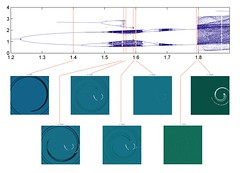December 29, 2011
The future of identity
 The Future of Identity, a report by me and Nick Bostrom commissioned for the UK Office for Science.
The Future of Identity, a report by me and Nick Bostrom commissioned for the UK Office for Science.
We are not dealing with a very far future (just the next 15 years or so), so the challenges to identity are pretty "normal. Just the growth of online identity as a key part of our social identities, which means that we get embedded in technological identity metasystems, social spaces spanning time, space and legal borders, and that identity technology begins to automatically tie together different aspects of our identities whether we want it or not. At the same time we are developing individualized conceptions of illness and health, with the body at least partially an expression of our values and aspirations. Further on medical advances in biotechnology, life extension, and neurotechnology are going to make our lives increasingly science fictional... from our current, equally science fictional perspective.
Talks for today: why we might want more people and less smart protocols
I just remembered today that my colleague Toby Ord a while ago gave an excellent talk about the question whether there is overpopulation or underpopulation in the world, and the talk is online. Very worth watching.
Another talk I enjoyed today was Meredith Patterson's talk about linguistics, Turing completeness and software security. A good explanation why protocols should not be too complex.
December 19, 2011
The seven percent solution
 The list of beneficial effects of intelligence is pretty long: childhood IQ predicts health, longevity, education, salary, and protects against suicide, homicide and a variety of ills like divorce. Cognitive ability also makes people better at handling economic games, thinking long-term and cooperatively.
The list of beneficial effects of intelligence is pretty long: childhood IQ predicts health, longevity, education, salary, and protects against suicide, homicide and a variety of ills like divorce. Cognitive ability also makes people better at handling economic games, thinking long-term and cooperatively.
A new study shows that the picture is more complex: James White, G David Batty, Intelligence across childhood in relation to illegal drug use in adulthood: 1970 British Cohort Study, J Epidemiol Community Health (2011). doi:10.1136/jech-2011-200252
They looked at use of illcit drugs among a cohort of 8,000 born in 1970.
When intelligence was factored in, the analysis showed that men with high IQ scores at the age of 5 were around 50% more likely to have used amphetamines, ecstasy, and several illicit drugs than those with low scores, 25 years later.The link was even stronger among women, who were more than twice as likely to have used cannabis and cocaine as those with low IQ scores.
...
The findings held true, irrespective of anxiety/depression during adolescence, parental social class, and lifetime household income.
BMJ
Why? A likely guess is that smart people are novelty seekers - they figure out things more quickly and hence get bored at school and jobs not tuned to their abilities, but they might also become smarter just because they try new things and hence have educational experiences. The paper also suggests that some might feel stigmatized by their peers. Yesterday I saw the new Sherlock Holmes film, and one can certainly see how these explanations fit into our culture.
Another interesting thing the study itself is silent on, but is worth investigating, is whether higher intelligence protects from the health effects of drug use. Smarter people generally have better health behaviours and better health (including both lower incidence of smoking and easier smoking cessation). I would conjecture that cognitive ability helps people manage their drug use, making it less likely to turn into abuse. We'll see.
December 14, 2011
Fun with Ikeda
 I have been having fun plotting bifurcations and crises in the Ikeda map.
I have been having fun plotting bifurcations and crises in the Ikeda map.
It all started when I did an entry on Wikipedia for crises in dynamical systems, and then I realized I needed an illustration. The Ikeda map is pretty good for this, since it has plenty of crises.
December 10, 2011
Ferreting out the flu
On Practical Ethics I blog about the ethics of evolving pandemic flu viruses for research.
December 02, 2011
Uploading the 6502
 www.Visual6502.org has one of the most impressive electronics archeology projects I have ever seen. They took a 6502 processor, exposed the silicon die, photographed its surface and substrate at high resolution, generated polygon models of the individual components, used the known rules for how they intersect to form circuits to automatically deduce the circuit diagram and hence produce a transistor-level simulation of the chip. This can be used to run programs, or old Atari games.
www.Visual6502.org has one of the most impressive electronics archeology projects I have ever seen. They took a 6502 processor, exposed the silicon die, photographed its surface and substrate at high resolution, generated polygon models of the individual components, used the known rules for how they intersect to form circuits to automatically deduce the circuit diagram and hence produce a transistor-level simulation of the chip. This can be used to run programs, or old Atari games.
See their SIGGRAPH 2010 slides for more detail.
This is a beautiful example of what WBE attempts to do to the brain, as well as a nice warning of just how tricky even well defined systems can be to handle. After all, this is a human-designed 2D system where we know perfectly what the components are supposed to do, everything has clean interfaces and there are just about 3,510 transistors to deal with. Still, it shows that we can reconstruct complex artifacts in a semiautomated manner. This ability will only get better over time.
Now I want to make myself a wall-poster of the real and uploaded processor.